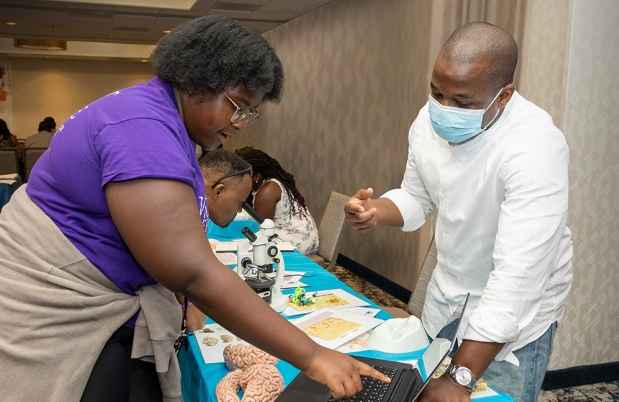McLean Hospital and Maine Department of Corrections Collaboration
Public Awareness and Community Outreach
It has been said that prisons in the United States have become the modern psychiatric “asylums.” According to data issued in September 2023 by The Prison Policy Initiative, 43% of people in state prisons have been diagnosed with a mental illness, with 74% of those indicating that they did not receive mental health services while they were incarcerated.
But the high rate of mental illness in prisons doesn’t only impact those who are incarcerated. The stress and daily conflict corrections officers face have resulted in 34% of officers developing post-traumatic stress and one-third being diagnosed with depression.
Corrections staff are more likely to die by suicide than they are to be killed in the line of duty.
With this in mind, McLean Hospital and its Deconstructing Stigma team have forged a partnership with the Maine Department of Corrections (MDOC) to address mental health stigma concerns among the offender population and the corrections staff.
Prison systems across the United States are often on the front lines of delivering mental health care.
Approximately 35% of incarcerated men and women in local jails and state prisons are estimated to have a serious mental illness—equaling approximately 383,000 individuals nationwide. Therefore, corrections officers play a critical role in delivering care to offenders. They are often the first to identify mental health concerns and respond to health problems.
While prison staff work to ensure offenders receive the mental health care they need, corrections officers—like many first responders—are hesitant to seek care for themselves.
The mental health crisis among prison workers is a silent epidemic, with more than 19% suffering from post-traumatic stress disorder and the risk of suicide being 39% higher for corrections officers than for all other professions combined.
MDOC and McLean Hospital, which has a long-standing commitment to improving the lives of individuals affected by mental health disorders, are partnering to address the needs of offenders and prison staff.
Through this Deconstructing Stigma collaboration, we are building greater awareness of the role that mental health plays in our lives while building compassion for individuals who struggle each day.
Maine State Prison – Warren, Maine
National studies have found that prison employees have a rate of PTSD roughly equivalent to war veterans who have served tours in Iraq and Afghanistan. While the rate of PTSD, alcoholism, and depression is alarmingly high among corrections officers and prison staff, few seek out mental health services before a crisis occurs.
The Maine State Prison (MSP), which houses male offenders, launched an initiative focused on developing an awareness campaign and curriculum designed to reduce mental health stigma among corrections officers.
As part of this work, we have expanded the Deconstructing Stigma campaign to include compelling stories of MSP staff—including Warden Randall Liberty, who openly discusses his own struggle with PTSD, trainings for prison staff with McLean Hospital mental health clinicians, the development of toolkits, and access to local and regional mental health resources.
Facts About Prison Staff Mental Health
- There are 434,870 corrections officers in the United States, and in a recent study, 19% of those surveyed reported symptoms that were severe enough to be diagnosed as PTSD
- Prison staff have the highest rates of mental illness, sleep disorders, and physical health issues of all U.S. workers
- Approximately a quarter of prison employees routinely experience serious threats to themselves or their families
- Almost half of prison employees have witnessed co-workers being seriously injured by offenders, more than half have witnessed an offender dying or encountered an offender who recently died, and the vast majority have dealt with offenders who have been recently beaten and/or sexually assaulted
- Reported depression rates were significantly higher among corrections officers than in the general population
- The risk of suicide is 39% higher for corrections officers than all other professions combined
Learn more about the exhibits at the Maine Department of Corrections
Women’s Center – Windham, Maine
Knowing that many incarcerated women have experienced trauma, including physical, sexual, and verbal abuse, the Deconstructing Stigma team is bringing the stories of hope and resiliency found in its anti-stigma campaign to the prison.
Many women struggle with untreated depression, anxiety, substance use, eating disorders, and issues related to LGBTQ+ mental health.
The hope is that by sharing these stories in both print and electronic form, in combination with educational outreach programming, we can improve the conversation around mental health and encourage offenders to seek treatment that will have a positive and lasting impact on their lives and those of their children and families.
Incarcerated Individuals and Mental Health
- 1.2 million individuals living with mental illness sit in jail and prison each year
- 6 out of 10 of the states with the least access to mental health care also have the highest rates of incarceration
- The most common illnesses were major depression, bipolar disorder, and schizophrenia and psychotic disorders
- 20% of males and 25% of females have severe psychiatric symptoms
- Nearly a quarter of offenders who had a mental health problem, compared to a fifth of those without, had served three or more prior incarcerations
- Data suggests that as many as 80% of incarcerated women meet the criteria for at least one lifetime psychiatric disorder
- 12% of women in the general population have symptoms of a psychiatric disorder, compared to 73% of females in state prisons, 61% in federal prisons, and 75% in local jails
Get Support
Many organizations throughout Maine offer support and services to individuals and families in need



